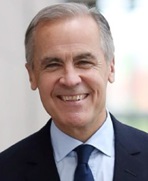Mark Carney – From Central Banker to Prime Minister:
A Global Economist’s Path to Canadian Leadership

Mark Carney is a distinguished Canadian economist, central banker, and now political leader, currently serving as the Prime Minister of Canada and leader of the Liberal Party. Known internationally for his calm, analytical leadership through some of the most turbulent economic periods of the 21st century, Carney has transitioned from a global financial figure to a national political force.
Born on March 16, 1965, in Fort Smith, Northwest Territories, Carney holds the distinction of being the first Canadian prime minister born in the North. He grew up in Edmonton, Alberta, where his early years were shaped by both the vast landscapes of the Canadian frontier and the discipline of a family deeply rooted in education and service. He later pursued higher education at Harvard University, earning a bachelor’s degree in economics, followed by postgraduate studies at the University of Oxford, where he earned a doctorate in the same field.
Carney began his career in investment banking, spending over a decade at Goldman Sachs. His transition to public service came in the early 2000s when he joined the Bank of Canada, eventually rising to the role of Governor in 2008. He took the helm during the global financial crisis and was widely credited for his steady hand and clear communication that helped shield Canada from the worst effects of the meltdown. His leadership drew international praise, earning him a reputation as one of the most competent central bankers of his time.
In 2013, Carney made history again by becoming the first non-Briton to serve as Governor of the Bank of England. He guided the UK economy through the uncertainty of the post-financial crisis recovery and later the complexities of Brexit. His tenure was marked by his focus on financial stability, climate risk, and inclusive capitalism.
After stepping down in 2020, Carney returned to Canada and took on roles advising governments and international institutions on climate finance and sustainability. He also became a leading voice on the urgent need for economic systems to adapt to the realities of climate change. His public profile grew further as he authored a widely discussed book, Value(s): Building a Better World for All, in which he laid out his vision for a fairer, greener economy.
In early 2025, following the resignation of Justin Trudeau, Carney was elected leader of the Liberal Party with overwhelming support. Though new to electoral politics, his credibility, global stature, and technocratic expertise quickly reshaped the party’s image. He assumed the role of prime minister just weeks later.
Carney's strengths lie in his deep understanding of economics, his calm demeanor under pressure, and his long-term vision for Canada’s role in a rapidly changing world. However, critics point to his lack of political experience and limited fluency in French as challenges he must overcome, particularly in key regions like Quebec.
Despite being a newcomer to electoral politics, Carney's entry into public life represents a blend of global experience and national purpose. As he leads the country into the 2025 federal election, many view him as a stabilizing force capable of guiding Canada through complex economic and geopolitical landscapes.
Source : Click Here

|